Picto Diary - 18 April 2016 - Hoover Retreat
Note: Note taker is fallible. Mistakes are his.
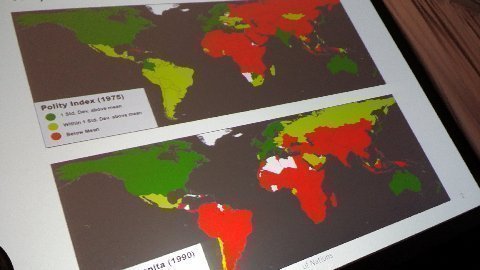
Above: Slide introducing presentation, "Where Do Democracy and Prosperity Thrive." How Climate and Geography Shaped Fundamental Political and Economic Institutions Around the Word, by Stephen Haber, professor at Stanford University and Peter and Helen Bing Senior Fellow at the Hoover Institution.
Hoover Institution Spring Retreat. Stanford University, Palo Alto, CA. 18 April 2016.
Harbors, abundance of navigable rivers, arable land, and low incidence of "shocks," ie. draughts, correlate to formation of independent producers, trade, democracies and prosperity. Areas without these advantages require a more centralized, autocratic control over food production/distribution and are less susceptible to evolving to democratic institutions
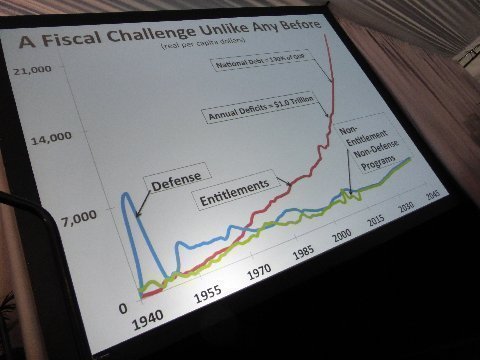
Above: Slide showing US Government spending over time divided into defense, entitlements, and discretionary. 40% of all continuing spending is borrowed. National debt is expected to exceed 100% of GDP by 2030.
Slide is from presentation of John J. Cogan, "The High Cost of Good Intentions: The March of Entitlements." Hoover Institution Spring Retreat. Stanford University, Palo Alto, CA. 18 April 2016.
John Cogan is a Senior Fellow at the Hoover Institution and a faculty member in the Public Policy Program at Stanford University.
It goes without saying that current, projected entitlement spending is unsustainable. Put another way, "Houston, we have a problem."
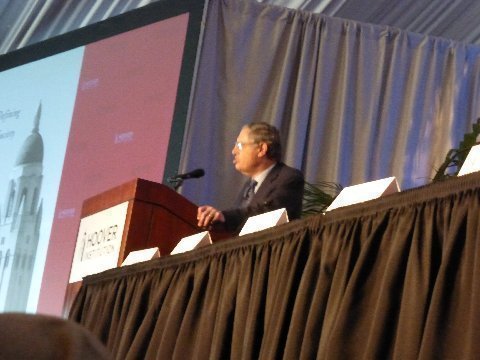
Above: Richard A. Epstein addresses attendees at the Hoover Institution Spring Retreat. 18 April 2016. Epstein is a Senior Fellow at the Hoover Institution, Professor of Law at NYU, and senior lecturer at the University of Chicago.
Excerpt from Richard A. Epstein's tribute to Justice Scalia dated 16 February 2016:
http://www.hoover.org/research/antonin-scalia-most-memorable-friend
At the luncheon following the DOJ talk, I sat at a table with Ed Meese, Robert Bork, and Antonin Scalia. The conversation quickly turned to the judicial role in commerce power cases, and elsewhere in the Constitution. Scalia took a strong line in favor of judicial restraint, which thus led to his acceptance of the 1937 settlement on the scope of the commerce power. Bork, as was his wont, pushed hard and wondered whether the difficulties with political faction required a more aggressive stance to curb federal power. Just as the discussion got more intense, an aide came up to Meese and in a stage whisper announced that the President urgently wanted him to go to the White House. Meese promptly left the table, and Scalia’s nomination to the Supreme Court was announced shortly thereafter. Who knows what tipped the balance between the only two leading contenders for the first nomination, or just what would have happened if both Scalia and Bork, who was later “borked,” had been on the Supreme Court together. But history often turns on strange coincidences.
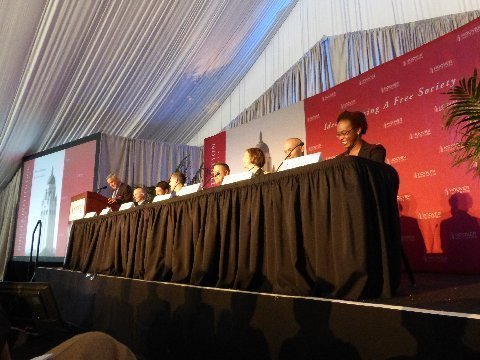
Above: Panel Discussion with Hoover Institution 2015-2016 National Security Affairs Fellows. Hoover Institution Spring Retreat. Stanford University. 18 April 2016.
Fellows are military officers, Lt. Col and Col, from all branches of the military service.
During Q and A I noted how one of the panel's predecessors, at last years Spring Retreat, reviewed the process and criteria whereby army officers are screened for advancement up the ranks. I noted that under those criteria, it seemed to me that neither Grant, Custer, nor Patton would have been able to advance in today's army. I asked the panel if a soldier's "fighting spirit" was considered when reviewing an officer for advancement.
The question was answered by Colonel Hollie Martin. Martin is a logistics officer and a 1994 graduate of West Point where, as a Spanish major, she earned a bachelor of science degree. She holds a master's degree in military operational art and science from the U.S. Air Command and Staff College.
Col Martin replied that "fighting spirit" was not a criterion used to advance military officers today. The army, she noted, laid more emphasis on inclusiveness, looking after your fellow soldiers, and making sure no soldier felt left out.
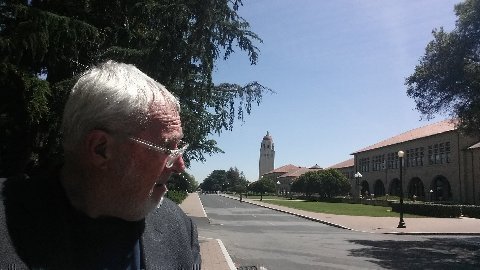
Above: Bishop observes Hoover Tower. Stanford University. Palo Alto, CA. 18 April 2016.
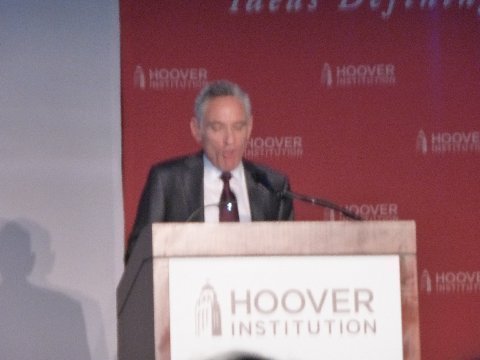
Above: Scott W. Atlas, MD, and Senior Fellow, Hoover Institution, addresses Hoover Institution Spring Retreat. 18 April 2016.
Topic: Cleaning up the Post-Obamacare Mess: Restoring Quality Health Care at Lower Cost
Obamacare is a failure on many fronts. For one, we are witnessing increasing consolidation under Obamacare in several areas of health care, including insurers, doctors, hospitals and pharmaceutical companies. This ongoing consolidation is going to reduce competition and therefore hurt consumers.
Six reforms are required to fix American health care.
1. Expand affordable private insurance.
2. Establish and liberalize universal health savings accounts.
3. In still appropriate incentives with rational tax treatment of health spending.
4. Modernize medicare for the twenty-first century.
5. Overhaul Medicaid and eliminate the two-tiered system for poor Americans.
6. Strategically enhance the supply of medical care while ensuring innovation.
Above points are amplified in Atlas' book: Restoring Quality Health Care. A Six-Point Plan for Comprehensive Reform at a Lower Cost.
Other Takeaways...
Paradoxically, as Obamacare is doubling down on government authority oer health care, the solution in those countries with the longest experience of nationalized health care, from Britain to Denmark to Sweden, is increasingly to shift patients toward private health care to remedy their failed systems.
Private insurance in the European nion has grown by more than 50 percent in the past decade.
In Sweden, despite the fact than an average family already pays nearly $20K annually in taxes toward health care, almost 600K Swedes now use private insurance, a number that has increased 67 percent over the last five years.
Unless Obamacare is drastically altered, America's health care will become even more divided. If sustained, it will be driven toward two parallel systems with even more inequality; as in the UK and elsewhere, only the lower and middle classes in America will suffer the full harm of Obamacare.
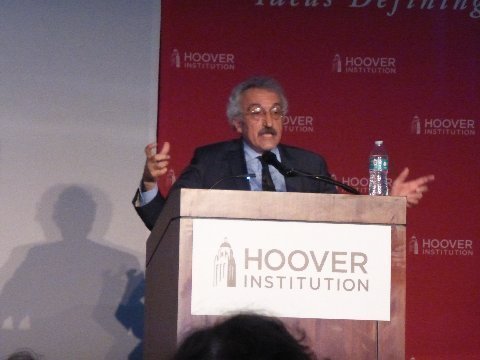
Above: Abbas Milani, Hoover research fellow and Director of Iranian Studies at Stanford University speaks at the Hoover Institution Spring Retreat, Stanford University. 18 April 2016.
Topic: ISIS, Iran, and Saudi Arabia
Note: Note taker is fallible... mistakes are his.
Take aways...
Somber news. Political conditions in the middle east are the worst in modern times. The US is not taking the situation sufficiently seriously. Current conditions pose a grave threat to global, international stability.
The current Islamic storm has been gathering and strengthening for the last 250 years. The best of the Muslims lack conviction to reverse the rise of the belligerents.... the worst are full of passion.
Islam and the west lived together for 1500 years... not without occasional culture clash.
Until the 17th century Islam was a contender, culturally, with the west.
As Islam was left behind... many Muslim thinkers fretted. Why have we lost our way? Many powerful mullahs and imams have clung to the idea that Islam has declined because it has lost its way. "We must go back to the old way of the prophets," these influential people say. "We should go back to the original texts... the Hadith," so goes their argument. Therefore, building, has been a movement to establish a new, Puritanical version of Islam.
Wahhabism
The new Islam puritanical movement was kindled by Mohammed Abdel Wahhab in what is now Saudi Arabia, 250 years ago. Wahhab, an Imam, cut a deal with the Saud family with respect to how the Arab world should be run. Saud would have complete political power, Wahhab and his fellow imams would have full authority in religious matters.
This "pax Islam" worked very well for a while.... until oil was discovered in the middle east.
The Saudis, became wealthy.
The followers of Wahhab... wahhabis... became puritanical, intransigent, and inured to the original words of the Koran and the Hadith. The last word of Allah, they pointed out, was that all inhabitants of the world must be subject to him... that included Christians and Jews.
The new wealthy political class has passed $80 billion to the Wahhabis to fuel the rise of the puritanical form of Islam. This money has been contributed to universities in the west to endow chairs in Islamic studies as well as mosques.
Wahhabism is doctrinaire... unfriendly.... haughty.
To advance wahhabism, the Muslim Brotherhood was founded in Egypt by Hassan al Banna, the most influential Muslim thinker of the twentieth century, in 1928. Muslim Brotherhood devotees believe Islamic law, Sharia law, should be implemented, as the principal form of governance, throughout the world. Muslim Brotherhood wahhabists do not accept secular, political authority.
The Muslim Brotherhood was an Egyptian phenomenon. In the 1950's and 1960's, Egyptian president, Gamal Abdul Nasser, a secularist, took a hard line against the Muslim Brotherhood. Many "brothers" fled from Egypt to Saudi Arabia during that time.
The Muslim Brotherhood has now evolved into a political movement.
In the 80's and 90's, the US launched an effort to aid Afghanis to resist the onslaught of Russian communism in Afghanistan. Saudi Arabia joined the US as an ally of that effort. Many members of the Muslim Brotherhood joined the US/Saudi fight against the USSR in Afghanistan.
What most did not understand was that the Muslim Brotherhood Islamists fighting for the Saudis in Afghanistan had their own agenda.
In Afghanistan, the wahhabists became well organized and politicized. Al Qaeda is an outgrowth of the wahhabi Afghanistan experience.
Iran
Sunnis make up 80% of Muslims... Shiites, 20%. Iran is Shiite... there are large concentrations of Shiites in Iraq, Lebanon, Bahrain and Azerbaijan.
The Iran leadership says the same thing as the Sunni Wahhabists. The credo of the Iran Revolutionary Guard Corps, the self styled " army of the guardians of the Islamic Revolution, see themselves as the ideological defenders of radical Islam. Their message is the same as the Sunni Wahhabists. They believe Sharia law must be implemented throughout the world.
To cement their revolution... Iran creates proxies... Hezbollah, in Lebanon, for example.
ISIS
The Sunnis are worried about the growing strength of the Iranis. They need an answer to the radical Shiites in Iran.
The radical Sunni answer was ISIS.
Sunni radicals - ISIS - filled the vacuum left by the departure of US troops from Iraq. Many generals, left over from Saddam's army, lived in Syria... these generals formed a core of leadership for ISIS. Syria also became a vacuum to be filled by ISIS expansion. Turkey opened its borders to allow ISIS fighters from foreign lands to join the fight.
ISIS now occupies an area larger than Denmark. They sell oil, gas, drugs, antiquities. They make effective use of social networking.
Their smartly published, glossy, monthly magazine, Islamic State Report, is published in five languages. They have published 14 issues to date
ISIS had a relatively easy time of it early on. They took the Iraqi city of Mosul with only 1500 fighters. The Mosul locals would much rather turn their city over to Sunni radicals than to Irani backed Shiite radicals.
ISIS is well organized, and its fighters are well trained.
ISIS says, "we are going to create such barbarity that the west will come and fight." They believe that the more random their terror is, the more efficient it is.
ISIS now reaches over 100 million people.
Their call to their followers is, "create mahem... eliminate the gray zone."
From "Islamic State Report," Islam is the only legitimate religion in the world. Out of the magazine come expressions such as "the management of barbarity." Images in the magazine show black, ISIS flags flying over the Eiffel Tower and the White House.
Conclusion
Islam surges (awakens) as a growing number of Muslims become more devoted to their faith.
Radical Islam, with roots in wahhabism (Sunni) and Iran (Shiite) is a violent extension of the Muslim awakening.
The West ignores the threat of radical Islam at its peril.
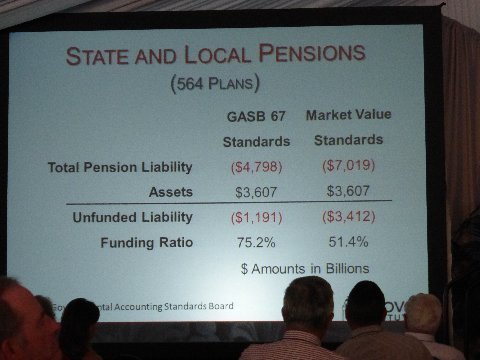
Above: Slide from Joshua Rauh's presentation at Spring Retreat, Hoover Institution. Stanford University. 18 April 2016.
Joshua Rauh is Senior Fellow at Hoover and professor of economics at UCLA.
Topic: Hidden Debt, Hidden Deficits: How Pension Promises are Swallowing State Budgets.
Most state and local governments in the United States offer retirement benefits to their employees in the form of guaranteed pensions. to fund these promises, the governments contribute taxpayer money to public systems. Even under states' own disclosures and optimistic assumptions about future investment returns, assets in the pension systems will be insufficient to pay for the pensions of current public employees and retirees. Taxpayer resources will eventually have to make up the difference.
Using market value accounting, 564 US state and local pension programs, collectively, are under funded by $3.4 trillion, with a funding ratio of 51.4%.

Above: Hoover Council Members and Hoover Overseers at cocktails. Frances C. Arrillaga Alumni Center, Stanford University. 18 April 2016.
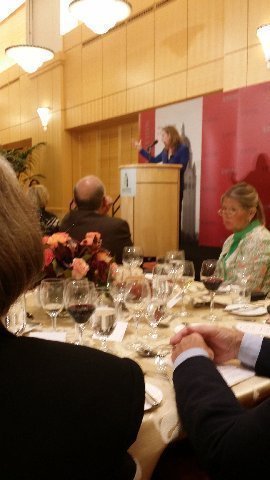
Above: Kimberley Strassel, Wall Street Journal Editorial Board, speaks to dinner guests at Hoover Institution Spring Retreat. Frances C. Arrillaga Alumni Center, Stanford University. 18 April 2016.
Topic: Presidential Passions in 2016
Politics today...
Extraordinary political season. Strange.
There have been many periods of political upheaval in our past. Always we came out better... so today's tortuous political conditions may deliver some good.
We are at a crossroads.
In 08 we elected a young, charismatic president.
Following a financial crisis, with Obama, we got a stimulus package, increased federal regulation, Obamacare, and an anemic economic recovery that never attained the 3% growth trajectory we have enjoyed throughout our history.
Government mismanagement was rife during the Obama administration: VA scandal, IRS scandal, egregious crony capitalism - Solyndra.
The world is in growing disarray, assisted in no small part by a "passive" Obama foreign policy.
Voters reacted to growing malaise in 2010 and 2014 elections electing a majority Republican House and Senate. Also, strong Republican majorities in state legislatures throughout the country.
Yet... nothing seemed to change, despite the new Republican majorities. There was a feeling of disenfranchisement on both the left and the right. There was a sense of alienation from Washington on the part of many Americans.
So... we get.... "the new politics."
The New Politics
There is no more restraint in campaigning.
No more political guard rails
"How you win" has changed. The political consultants who set the "old rules" are on the outs.
Trump has earned significant media time sans having to pay for it. He has shown political mastery in sensing how to keep media attention on him.
"What makes a winner" seems to be all personality. There is very little talking about issues. No talking of great ideas. No aspirational appeal to America's potential.
Such periods seem difficult as we move through them... but, out of the kind of political conflict we see today, often comes transformational change for the better.